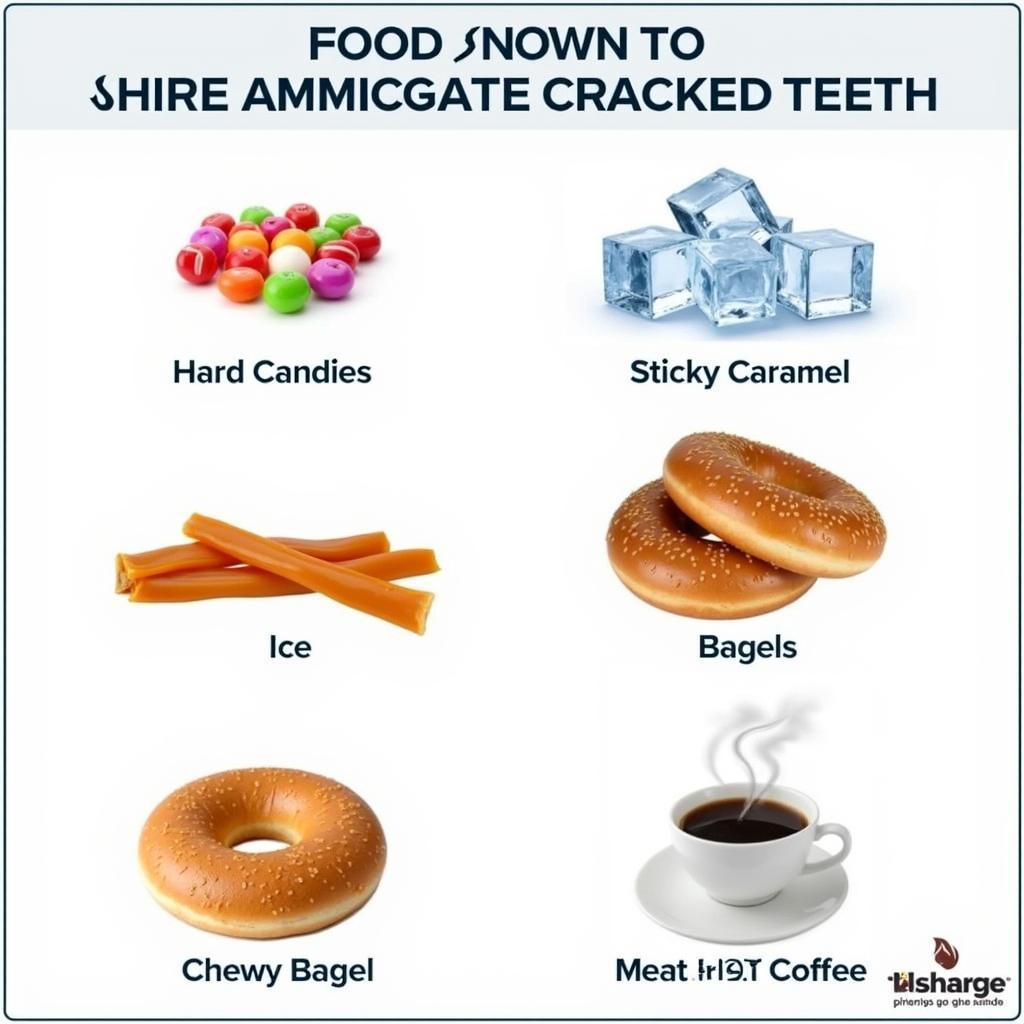A cracked tooth can be a real pain, literally! Knowing which foods to avoid with a cracked tooth can significantly reduce discomfort and prevent further damage. This guide will walk you through the foods that can exacerbate a cracked tooth and offer some helpful tips for maintaining good oral health.
Understanding the Sensitivity of a Cracked Tooth
A cracked tooth exposes the inner layers of your tooth, including the dentin and sometimes even the pulp, which contains nerves and blood vessels. This exposure makes the tooth highly sensitive to temperature changes, pressure, and certain foods. Avoiding these triggers can help manage pain and protect your tooth from further damage.
Foods to Steer Clear of with a Cracked Tooth
Several types of food can aggravate a cracked tooth. It’s important to be mindful of your diet and avoid these culprits:
- Hard Foods: Biting down on hard foods like nuts, hard candies, ice, and popcorn can put excessive pressure on the cracked tooth, leading to increased pain or further cracking. Chewing on ice is especially harmful as the extreme temperature changes can also cause sensitivity.
- Sticky Foods: Caramel, toffee, gummy bears, and other sticky treats can adhere to the cracked area, pulling on the fragile fragments and potentially worsening the crack. They can also be difficult to remove, increasing the risk of bacterial growth and infection.
- Chewy Foods: Tough meats, bagels, and other chewy foods require significant force to break down, placing stress on the cracked tooth. Opt for softer alternatives like well-cooked vegetables, fish, and ground meats.
- Extremely Hot or Cold Foods: Temperature sensitivity is common with a cracked tooth. Avoid very hot or very cold foods and beverages as they can trigger sharp pain. Let your food and drinks cool down or warm up slightly before consuming them.
 Image showing foods to avoid with a cracked tooth If you’re experiencing tooth pain from trapped food, check out our article on toothache from food stuck in teeth.
Image showing foods to avoid with a cracked tooth If you’re experiencing tooth pain from trapped food, check out our article on toothache from food stuck in teeth.
What Can I Eat with a Cracked Tooth?
While avoiding certain foods is essential, choosing the right foods can also help nourish your body and support healing. Soft, nutritious options are ideal:
- Soft Fruits and Vegetables: Cooked or mashed vegetables like potatoes, sweet potatoes, and carrots are excellent choices. Soft fruits like bananas, applesauce, and ripe peaches are also good options.
- Yogurt and Cheese: Dairy products are rich in calcium and phosphorus, which are essential for strong teeth.
- Soups and Broths: These are easy to consume and can be packed with nutrients.
Why Should I Avoid Certain Foods with a Cracked Tooth?
Ignoring dietary recommendations can lead to several complications:
- Increased Pain: Eating the wrong foods can exacerbate pain and discomfort.
- Further Damage: Hard and sticky foods can worsen the crack, potentially leading to infection or the need for more extensive dental treatment.
- Infection: Food particles trapped in the crack can promote bacterial growth, increasing the risk of infection.
How to Manage Pain from a Cracked Tooth?
Over-the-counter pain relievers can help manage discomfort. A warm saltwater rinse can also provide temporary relief. You can also discover remedies for food stuck between molars pain.
“A cracked tooth should never be ignored,” says Dr. Emily Carter, DDS. “Prompt dental attention is crucial to prevent further damage and potential complications. Early intervention often leads to simpler and less invasive treatment options.”
When Should I See a Dentist?
If you suspect you have a cracked tooth, see a dentist immediately. Early diagnosis and treatment are essential to prevent further damage and preserve your tooth. If your tooth hurts when food gets stuck, it’s crucial to address the issue promptly.
Conclusion
Knowing which foods to avoid with a cracked tooth is vital for managing pain and preventing further damage. By following these dietary guidelines and seeking prompt dental care, you can protect your oral health and ensure a healthy smile. Remember to avoid hard, sticky, and chewy foods, and opt for softer, nutritious alternatives. For more information about managing tooth pain food stuck, visit our dedicated page. Additionally, if you’re looking for suitable food to eat when you have toothache, we have a comprehensive guide available.
FAQ
- Can a cracked tooth heal on its own? No, a cracked tooth requires professional dental treatment.
- What are the treatment options for a cracked tooth? Treatment options vary depending on the severity and location of the crack, ranging from bonding to a crown or root canal therapy.
- How can I prevent cracked teeth? Avoid chewing on hard objects, wear a mouthguard during contact sports, and practice good oral hygiene.
- Is pain always a symptom of a cracked tooth? Not always. Sometimes a cracked tooth may not cause any pain.
- Can a cracked tooth lead to tooth loss? Yes, if left untreated, a cracked tooth can lead to infection and eventually tooth loss.
- What does a cracked tooth feel like? It can range from sharp pain when biting to a dull ache or sensitivity to temperature.
- How is a cracked tooth diagnosed? Dentists use various methods, including visual examination, dental X-rays, and bite tests.
Need Help? Contact Us:
Phone: 02437655121
Email: minacones@gmail.com
Address: 3PGH+8R9, ĐT70A, thôn Trung, Bắc Từ Liêm, Hà Nội, Việt Nam. We have a 24/7 customer service team.